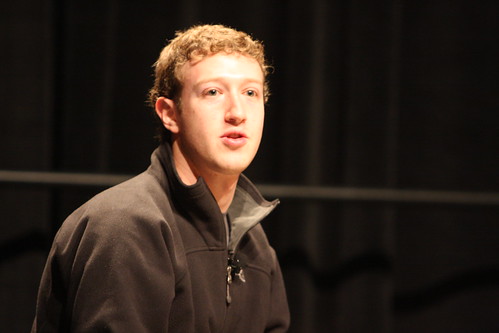As an analyst, that’s the questions that I’m asked over and over again. In fact it was the same question CNN recently asked in its story last week on Zuckerberg, Facebook, and Wall Street. It’s a fair question to ask and CNN’s Heather Kelly wrote a balanced and thoughtful piece on the subject. While it’s only one of many discussions likely to happen, the truth is that Facebook must focus on its business, employees, and now also investors…regardless of technicalities, follies, insider discussions, etc.
This is a long term play. We all know it. But, we tend to talk about this in the short-term. While only a couple of quotes were used in the CNN piece, I wanted to share the full discussion with you. Perhaps someone at Facebook will read and Like this and share it with employees and investors.
CNN’s Heather Kelly: The recent reports on if Zuckerberg should be out as CEO made me wonder if he just needs more time, if there are specific things he needs to step-up and do, or if it’s just instinctual to blame the CEO for a companies poor performance.
It’s natural in any situation to find a scapegoat if the story’s negative or a hero if the story is positive. Unfortunately, the Facebook IP(uh oh) was plagued with problems from the onset. The market needs to points the finger somewhere and it’s not a thumbs up to signify a “Like.” Mark is young, now incredibly wealthy, and unusually quiet (private) for a notable business leader. He’s almost the perfect archetype to pin the blame. But, the company is far from underperforming. Additionally, Facebook as a product is too far from underperforming. At almost one billion users, Facebook accounts for somewhere between 38-42% of all Internet users around the world. As of July 26th, Facebook also reported that revenue grew 32% to $1.18 billion in the second quarter, which was slightly above analyst expectations. On August 23rd, Facebook released a new improved version of its iOS app and the market is mostly positive about the new release. Lastly, with the approval of the Instagram acquisition, Facebook can focus on improving the mobile experience in order to more effectively monetize it.
To quote my friend and technology investor Shervin Pishevar, “I’m bullish on Facebook because I’m bullish on human relationships.”
CNN: What are some of the biggest criticisms of Zuckerberg from investors right now?
First and foremost, Mark is viewed as an idealistic CEO whose focus on connecting the world over building a profitable business.
Mr. Zuckerberg is often questioned about the caliber of his experience and whether or not its enough to lead a publicly traded company into positive territory and more importantly, instill confidence in the investor community. There are also allegations that Mr. Zuckerberg took part in the over-valuation of Facebook prior to the IPO. Other complaints are more trivial in nature. His young age opens the door to criticisms that he appears immature and doesn’t care about the performance of the stock. And that like Steve Jobs, Zuckerberg doesn’t want to answer to anyone.
CNN: What should he, as CEO, do to address the situation? More disclosure on expenses and how Facebook’s operating costs will result in revenue? Just communicating more? Stay silent?
There isn’t a right or wrong answer to this question. Mark Zuckerberg is very much like Steve Jobs in his approach to the product over investors and critics. Mr. Jobs wasn’t always successful. He too faced financial difficulties and product failures. Mark is very much focused on building the best product and experience for a multitude of varying consumers from diverse cultures across differing devices and connection speeds. That’s no easy task.
The company however, could invest more time in earning the confidence of investors. Now that its a publicly traded company speculation can either work for or against you. In Apple’s case, the company mastered spinning positive speculation to great fanfare around product releases. For Facebook, speculation is working against the company as measured by the stock price not the company’s revenue, which if you think about it, is part of the problem. Investors don’t know how to think about Facebook most likely because they don’t use the it. They probably use LinkedIn and think Facebook is for their kids. That’s a misperception that contributes to the bigger problem. Speculation about Mark’s capabilities as a leader also contributes to the problem. Staying quiet and avoiding these important topics is not a strategy I recommend. Even Apple needed to break its silence when the market got the story “right” or wrong according to Steve Jobs.
CNN: Is his inexperience as a CEO insurmountable or is it necessary to have him there since he’s the founder/key to the brand?
It’s his vision that makes Facebook so successful. It’s his dedication to the Hacker Way that keeps some of the world’s best developers religiously following his lead. In working with Sheryl Sandberg, he’s able to focus on as he calls it, “shipping.” That’s what investors need. But they do also need to hear from someone in the organization that can give them faith.
CNN: Do there need to be changes to the Facebook business model, or just more communication with employees and investors to boost faith in the current model? Is it just part of the social media cycle (sites lose member’s interest, a la MySpace, Friendster)?
Mark is perpetually competing for relevance. That’s his mission. That’s what investors don’t get. MySpace and Friendster lost track of the original vision because the companies tried to put “the right” people in top roles to appease investors or shareholders. And, it could be argued that MySpace and Friendster stopped competing for relevance…stopped thinking about improving the user experience. Facebook is focusing on mobile which is where it needs to be. Combined with the ongoing quest to stay cool and push people into sharing more and more about themselves will help keep them coming back to Facebook because there is actual value in doings so. Aligning that experience with monetizable opportunities for brands so that there’s value on both sides of the experience will only help. Investors can find solitude in that Mark Zuckerberg brings Jobs like tenacity and focus to solving these problems and any problems that will emerge over time.
CNN: Do you think low employee moral is dangerous (will they sell off more shares when the lockup period is over and would that have a big impact on FB)?
Morale is always an issue for a publicly traded tech company. One minute you’re trading at $36 and the next you’re at $19. Those dramatic swings can wipe away a significant chunk of an employee’s net worth. Mark has done the best he can to invest in a culture where money isn’t the endgame, but instead incentive for hard work. On the eve of its IPO, Mark hosted a Hackathon. He focuses on shipping and user experience. He gives his employees a mission to believe in. Facebook has a positive role in this world and it is this sense of higher purpose that has a better effect on morale than cashing out. At least that’s the hope…
As I shared with Al Jazeera pre-IPO, “In an era of digital Darwinism you have to compete for relevance in real time, almost faster than real time,”
Connect with me: Twitter | LinkedIn | Facebook | Google+
The End of Business as Usual is officially here…







The falling stock of facebook is not on the shoulders of Zuckerberg, and should not be replaced. In a similar case, Steve Jobs (Founder and FormerCEO of Apple) was fired via the board of directors as CEO of a company he started. It was his vision that took Apple where it needed to go. When things got slow, they fired him, and things continued to stay slow for Apple. Years later Jobs was designing different software, and Apple had to choice but to purchase the new company Steve Jobs founded, accruing the new software, and implementing it in Apples new products. He was then reinstated as CEO of Apple, and took the company to a new level based on his initial vision.
Zuckerburg leads by example…And right now, he is still responsible for creating the most powerful social network in the world. Would it be a smart move to hire a public face who says all the right things? (which is impossible) Most likely, but we all know that the reason Zuckerburg created Facebook in the first place was to fulfill his desires to be noticed, recognized, validated, and/or respected by his peers. He wanted to be cool in college, something almost all of wanted. A lot of his ego is wrapped up in his current role, so it’s hard for me to see him stepping down in any way. Ego’s aside, Zuckerburg has the one thing that matters, the passion to create a better user experience. The fact that he is more concerned about the experience, than the stock price, makes it hard for me to criticize him, then again, I didn’t buy any stock ha.
Zuckerburg has the one thing that matters, the passion to create a better user experience.
What people need to come to terms with is that Facebook is not the communications platform they thought it would be. Shervin Pishevar has it right when he says Facebook is a relationship company. It builds community through the human instinct to share personal information, not so much consumer insight, but things about our families and friends.
The value for Facebook is there, but they must first realize that they can’t be all things to all people. Or maybe it’s better said, all networks to all advertisers. The people under 21 have basically abandoned Facebook in favor of a more real-time tool. Facebook is a great archive, but generally people now don’t think about memories until they have college behind them.
Hi Brain,
It was to do with the package the company to brokerages. It was also overvalued before IPO.
Thanks
Dara
I don’t like when Zuckerberg is compared to Jobs. Zuckerberg has several distinct differences from the late Steve Jobs.
Jobs was a maniacal perfectionist, he believed in simple, intuitive and elegant experiences; Zuck believes in shipping things whether they are ready or not, well thought out or not and often gives little thought to creating a simple user experience. He’s more the over-engineered, over-cluttered, bloated experience you find in Windows or iTunes.
Jobs created the “reality distortion field,” he understood how to get buy-in when necessary and to enchant people with ideas and products; Zuck seems nervous and uncomfortable, and has done everything in his power to make people distrust his motives.
It’s hard to get people to “buy-in” when you are not trusted. Zuck’s problem is his image, and he is the face of Facebook. Ergo, people don’t “trust” Facebook. If Zuck wants to right the ship and stay relevant, he has to silence the critics that know his true motives are to get people to unknowingly divulge information that Facebook can sell. More thought needs to be put in to making a profitable product that doesn’t violate user trust.
So… what’s the future for Facebook..? No matter what, I think Zuck should be applauded for bringing the world together on one social platform.
Facebook occupied whole world. Every young kid from my place is there. But I think popularity of Facebook will drop down too. Just matter of time.
its just someone pretending to be a social networking site gathering data then selling it to the highest bidder, its a political tool, ins not objective, its an example of the lie america has become the tallest people cast a long dark shadow
faggots on face buck do not represent americas interest and therefore should not have any say in social networking sites like facebook–zuckey is a menace, and will eventually bring facebook down, which may have been the plan all along, to get an ipo, sell shares when its high take the money and run, eh ? zucky
google is so superior to farcebuck I wonder how an ipo was listed on the NYSE other than to steal the money of unwary invesors